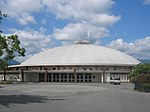E-Comm
E-Comm 9-1-1 is a multi-municipality agency that provides emergency communications operations for British Columbia. The company coordinates 9-1-1 service for police, fire, and ambulance service, providing call-taking and dispatch services for multiple agencies in the Lower Mainland area. E-Comm's service area covers Metro Vancouver (from Lions Bay to Langley), the Sunshine Coast Regional District, south Squamish-Lillooet Regional District the Whistler-Howe Sound and Fraser Valley Regional District area serving residents in the province. The company provides call-taking for all participating municipalities, transferring incoming calls to the appropriate agency. Furthermore, E-Comm provides dispatch services for eighteen police and fire departments.E-Comm owns and operates the Wide-Area Radio Network (WARN), a shared communications system used by police agencies, fire departments and the entire British Columbia Ambulance Service in Metro Vancouver. The WARN features earthquake-resistant infrastructure and enhanced security measures, providing improved coverage, clarity, and reliability. The WARN allows for real-time communication between members of separate agencies, increasing inter-agency communication and coordination. WARN was replaced in Spring 2018 by the Next Generation Radio Program (NGRP)
Excerpt from the Wikipedia article E-Comm (License: CC BY-SA 3.0, Authors).E-Comm
East Pender Street, Vancouver Hastings-Sunrise
Geographical coordinates (GPS) Address Nearby Places Show on map
Geographical coordinates (GPS)
| Latitude | Longitude |
|---|---|
| N 49.280208333333 ° | E -123.03358611111 ° |
Address
East Pender Street
East Pender Street
V5K Vancouver, Hastings-Sunrise
British Columbia, Canada
Open on Google Maps








